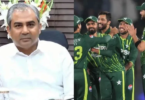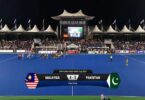Monitoring Desk
KARACHI: Straddling the edge of the Arabian Sea, Lyari, a small shantytown south of Pakistan’s commercial capital Karachi, has long been a poster child for gang wars and drug trafficking.
However, it is also known as “mini Brazil” among soccer fans for the talented male football players that this run-down locality has produced over the decades. Now, young girls are making their way into the world of football, representing national and local teams.
As the sun started to wane, a group of around 20 young girls, some of them with sporting headscarves, entered the Karachi Metropolitan Corporation (KMC) football stadium in the heart of Lyari and surrounded by tall buildings, old and new. Attired in loose shirts and long shorts, the girls stepped out into the field for practice as their coach blew the whistle.
“Football runs in our blood. Not only me, but all my teammates aim to represent Pakistan’s national squad in years to come,” Shah Bibi, 17, of Lyari United Football Club, one of the two major women’s soccer clubs in Lyari, told Anadolu Agency.
Bibi, whose favorite player is Argentina’s Lionel Messi, was one of the dozens of Lyari girls who took part in the National Women Championship held at her home ground in April this year. Some 20 teams with 350 players from all over the country, including two from Lyari, participated in the tournament.
Hailing from a conservative ethnic Baloch family, Bibi faced resistance, mainly from her brothers, when she started playing football two years ago after being inspired by her male cousins. “It was intervention and encouragement from my coach and family friends that kept me going. My recent performance at the National (Women) Championship not only made me a hero in my locality but also put an end to my brothers’ opposition,” Bibi said, smiling.
Iqra Mehar Bux, a 15-year-old goalie for the same club, aspires to be the national squad goalkeeper but also wants to play in an international football league. “Wearing Pakistan’s colors is my dream. But, to earn money and fame, you have to join an international league,” Bux, a fan of Cristiano Ronaldo and Mohamed Salah, said as she tried to stop a kick from a teammate.
“We practice for at least two hours every day. No break, except for eids (two Muslim religious festivals) or other important holidays,” she maintained. Aqsa Dawood, who represents Bibi and Bux’s main rivals in the Jaffa Football Club, has recently participated in the Asian Football Confederation qualifying round.
Lyari is home to 1.5 million people of different communities and ethnicities, the majority of whom are Baloch and Katchis, the city’s oldest inhabitants.
The area has over the last 74 years produced a large number of players who have won many titles for the country, especially between the 1950s and 1960s, known as the golden era of Pakistan’s football team.
Flying against odds
Football is a popular sport in the otherwise a cricket-frenzy Pakistan, particularly in rural areas. Yet, the national team is ranked 200th in the FIFA World Rankings.
Lacking glamor and government funding, while having to deal with intra-federation schisms and land-grabbing petty mafia who have been sweeping up sports grounds, football in Pakistan has gradually declined from its previous rank as fourth on the Asian continent in the 1960s.
“There is no government or private funding to run this club,” Ahmad Jan, an international referee and coach for the Lyari United Football Club, told Anadolu Agency.
“Take this ground, which is the property of Pakistan’s largest metropolitan corporation [Karachi], but it doesn’t spend even a single penny on its maintenance. Everything you see here is on a help-yourself basis,” Jan, who played for Pakistan in the 1970s, lamented.
In April this year, FIFA suspended the Pakistan Football Federation’s membership for six months, citing a hostile takeover of the federation’s head office by a rival group. The action was taken when the group refused to vacate the office and hand it over to a FIFA-approved group.






